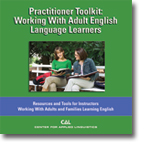 Practitioner Toolkit: Working with Adult English Language Learners
Practitioner Toolkit: Working with Adult English Language Learners
This toolkit provides a variety of materials to help language and literacy instructors who are new to serving adults and families learning English. These materials include a first-day orientation guide, lesson plans, and research-to-practice papers on English language and literacy learning.
Download the complete Adobe PDF version of the Practitioner Toolkit. (1.7 MB, 241 pp.)
Or, browse through the Table of Contents below and select the topics that are of need to you and your program. The individual sections are available as PDFs.
This section of the Toolkit provides activities that teachers can use in their classes with learners from beginning to advanced levels of English language and literacy. Forms, surveys, and questionnaires that teachers can copy and use often accompany the activity descriptions. Activities are outlined in the following areas:
-
Orientation of new learners to programs
-
Needs assessment of learners and learner self-evaluation
-
Lesson planning
-
Activities to promote interaction and communication in classes
-
Activities to promote reading development
Needs Assessment and Learner Self-Evaluation
Lesson Planning
Activities to Promote Interaction and Communication
Activities to Promote Reading Development
Part III Parent
Education in Family Literacy Programs
Part III presents information about parent education as one of the four components of family literacy. Parent education is designed to help parents improve their skills at being the primary teacher for their children and become full partners in the education of their children.
This section begins with a brief description of family literacy, explains the goals and structure of parent education, offers strategies for implementing parent education, and provides activities that parents can engage in with their children at home and in their communities.
Parent Education
Overview
Parent Education
Instructional Strategies
Parent Education
Activities
Sample Parent Education
Lessons
Literacy
Activities in the Home
Part IV Topics in Adult ESL Education and Family Literacy
Part IV provides discussion papers for educators who want more in-depth information pertaining to adult ESL education and family literacy. The following topics are addressed:
-
Research on second language acquisition and learning to read in a second language
-
Assessment of adult English language learners, including a discussion of federal requirements for accountability reporting and the use of assessments for tracking learner progress
-
Assessment instruments, including annotated charts showing published assessment instruments that are used in the field to assess English language and Spanish language proficiency
-
Research-based strategies for working with adult learners with learning disabilities and other special needs
-
Transition strategies used to help learners progress beyond adult ESL classes to other educatio nal and work opportunities
-
Permanent residency and citizenship attainment, including strategies for preparing students for the citizenship exam
English
Language and Literacy Learning: Research to Practice
Assessing
Adult English Language Learners
English Language
Assessment Instruments for Adults Learning English
Spanish Language
Assessment Instruments for Adult Spanish Speakers Learning English
Adult English Language
Learners and Learning Disabilities
Addressing the Needs
of Specific Groups of Learners
Helping Adult English
Language Learners Transition into Other Educational Programs
Preparing
for Permanent Residency and Citizenship
Part V provides information for practitioners working in adult ESL and family literacy programs on where to find additional resources.
Acknowledgments
This Toolkit was developed by the National Center for Family Literacy (NCFL) in Louisville, KY in collaboration with the National Center for ESL Literacy Education (NCLE) at the Center for Applied Linguistics (CAL) in Washington, DC. Under the direction and guidance of Ursula Lord, Contracting Officer Representative (COR), Office of Vocational and Adult Education (OVAE), U.S. Department of Education.
Writers on this project include Sylvia Cobos Lieshoff, Noemi Aguilar, and Susan McShane, NCFL, and Miriam Burt, Joy Kreeft Peyton, Lynda Terrill, and Carol Van Duzer, NCLE.Content development, editorial services, and support were provided by Lynn Spencer and Diane DeMaio of OVAE Akeel Zaheer, Brenda Logan, Gail Price, Jennifer McMaster, and Justin Keibler of NCFL.
We are grateful to the hundreds of respondents to NCFL’s surveys and to the following focus group participants. Their input on the strengths and challenges of adult English language learners in their programs provided valuable insight that helped focus the content of this Toolkit.
Sr. Guadalupe Arciniega Debby Cargill Christine Hicks Jacqueline Isbell |
Susan Lythgoe Mary Helen Martinez Sharon McClaren Leslie Shimazaki Vicky Tangi |
This document was designed and written
by
The National Center for Family Literacy
and
The National Center for ESL Literacy Education at the
Center for Applied Linguistics
December 10, 2004
The opinions expressed herein do not necessarily represent the positions or policies of the U.S. Department of Education, and no official endorsement by the U.S. Department of Education should be inferred.
This project was funded through a contract from the U.S. Department of Education’s Office of Vocational and Adult Education to DTI Associates of Arlington, Virginia.
Updated with PDF files used for print publication: July 21, 2008
| Order a print version of the Practitioner Toolkit for ease of use and reference from the CAL Store. |



